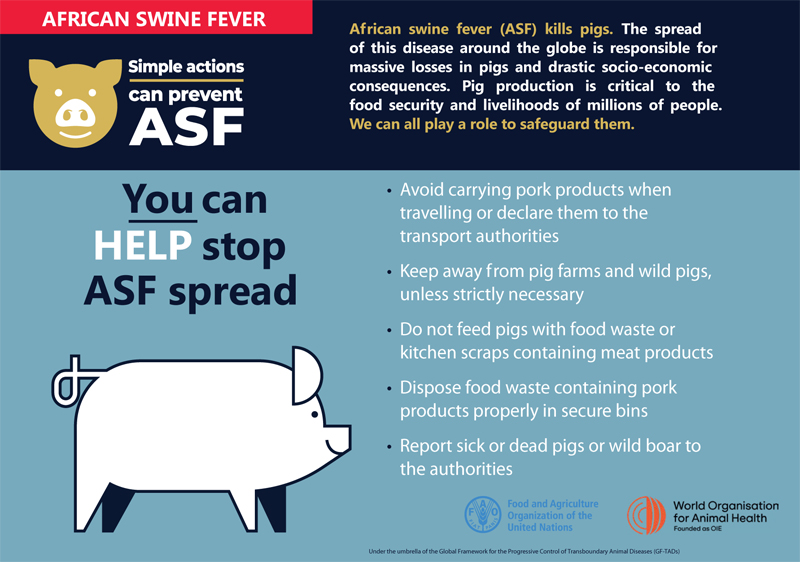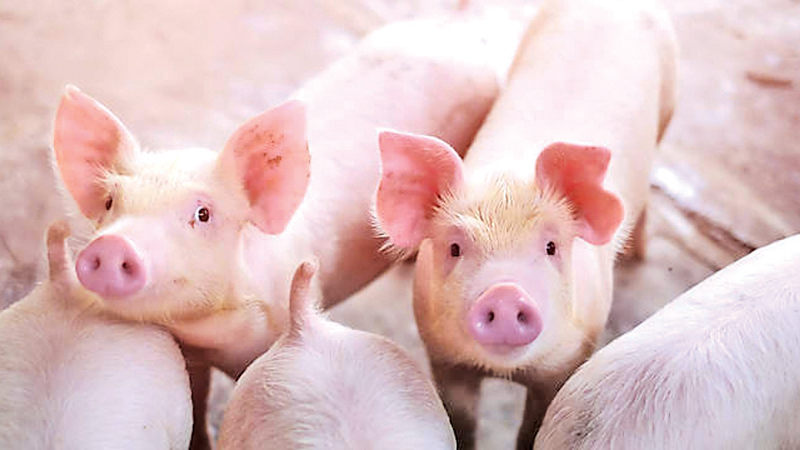This week the Government declared all Divisional Secretariat areas nationwide as African Swine Fever (ASF) and Porcine Reproductive and Respiratory Syndrome as infected zones. The Government issued the communiqué under the Animal Diseases Act No. 59 of 1992.
This Order enforces strict measures, including a ban on the transport, sale and slaughter of pigs and related products. The directive, which is valid for three months aims to contain the outbreak and minimise the risk of spread. Veterinary and animal health officials have been tasked tasked with overseeing its enforcement.
African swine fever virus (ASFV) is a DNA virus in the Asfarviridae Family; genus Asfivirus. ASFV is the sole member of its Family. However, the virus does not affect people and there is no impact on human health.
ASF occurs through transmission cycles involving domestic pigs and wild boar. The virus can be directly transmitted via contact between sick and healthy animals. ASFV can be indirectly transmitted by feeding on garbage containing infected meat and contamination via premises, vehicles, implements and clothes. Fortunately, humans are not affected by ASF you cannot get sick by eating pork products or contact with pigs.
First outbreak
The first outbreak was in 1907, after the virus was first described in 1921 in Kenya. ASF remained restricted to Africa until the late fifties, when it was reported in Portugal.
A further outbreak occurred in Portugal in 1960. The disease became established in the Iberian Peninsula and sporadic outbreaks occurred in France, Belgium and other European countries during the 1980s. Both Spain and Portugal had eradicated the disease by the mid-1990s through a slaughter policy.
ASFV crossed the Atlantic and outbreaks were reported in some Caribbean islands, including the Dominican Republic and Haiti. US border authorities on high alert to prevent any spread to the US, which would inflict billions of dollars of damage to the American pork industry. Major outbreaks in Africa are regularly reported to the World Organisation for Animal Health.
Economic loss
In 2018 the virus spread to Asia, affecting more than 10 percent of the total swine population in several countries, leading to severe economic loss in the pig sector.
According to the General Manager of the National Livestock Development Board (NLDB), Dr. K.G.J.S. Disnaka, the ASF outbreak in Sri Lanka is likely to have come from imported contaminated pork since this is the first time the virus has been detected in the country.
“ASFV is dangerous because it is highly contagious. When infected it can wipe out an entire swineherd and there is still no vaccine against the disease,” he said.

The first infection was detected in the Western Province and now the virus has spread to almost all parts of the country. In other countries, ASF is controlled by culling the herd and disposing the pig carcasses.
“The Government introduced a Gazette to halt transport, sale and slaughter of swine but this is just the beginning. In countries with stricter policies, animals are culled once an outbreak is detected. It’s hard to enforce these Laws in Sri Lanka but the NLDB will introduce a programe to curb the disease,” he said while adding that ASFV is a particular challenge since it doesn’t have a vaccine”.
Ingestion and physical contact
The virus is passed via respiration, ingestion and physical contact and it can be present for a long time in the premises, machinery, vehicles and clothes of those who work with livestock.
The ASFV can be inactivated at very high temperature, he said but added that the virus can stay dormant in farms for months even after culling and isolation has taken place and start spreading again.
The virus has been reported in several Provinces already with high infections in the Western Province, the ground zero for ASF in Sri Lanka.
He said that contaminated pork could have been imported for high-end restaurants. Dr Disnaka said the danger lies in the virus spreading to and devastating wild-boar and the feral pigs. “Pork with ASFV can easily cross-contaminate game meat and this can be carried to wild boar through activities such as hunting”.
Chef Deshamanya Dilrukshan Dabare, founder of the Professional Chef Association and restaurant industry consultant said that star class hotels and restaurants are trying to procure meat from certified exporters overseas according to strict hygienic standards. “However, this is hard due to the high taxes and this prompts restaurants and hotels to procure pork from local producers. Even though pork is not served all the time, certain star-class establishments have it in stock to maintain standards and they do this by importing meat from a trusted source. Because they know that they will lose their licence if something goes wrong”, he said.
Chef Dabare said restaurateurs are very careful with procurement and check history and credentials of suppliers before purchasing. “We also have quality control labs in hotels to test meat. With all this data we know when the animal was slaughtered and how old the meat is, ” he added.
Small businesses are also reeling after the outbreak. Save for large-scale farms, swine herding in Sri Lanka is limited to a cottage industry where one or two pigs are fattened and sold to butchers. Since the Gazette will be in effect for three months, small businesses anticipate massive losses in the upcoming Festive season.
Bleak outlook
Retailers too are sharing a bleak outlook. Pork is sold in just three grocery stores in Kandy with the exception of supermarkets in the city. One store that specialises in farm-fresh produce said they had to get rid of their entire stock of pork following the Gazette notification.
As the ASF containment measures take effect, Sri Lanka’s pork industry faces a challenging road ahead. From small-scale swine farmers and local retailers to luxury hotels and restaurants, the impact of the ban on transport, sale and slaughter of pigs is being felt across the sector.
Small businesses brace for financial strain with the festive season approaching, while high-end establishments work to maintain strict sourcing standards to reassure patrons. With the NLDB’s upcoming disease-control program, the authorities and industry stakeholders are doubling efforts to mitigate the ASF outbreak’s economic and operational fallout, aiming for long-term solutions in bio security and disease management.




